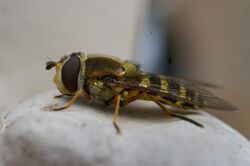Biology:Parasyrphus annulatus
| Parasyrphus annulatus | |
|---|---|

| |
| male | |

| |
| female | |
| Scientific classification | |
| Domain: | Eukaryota |
| Kingdom: | Animalia |
| Phylum: | Arthropoda |
| Class: | Insecta |
| Order: | Diptera |
| Family: | Syrphidae |
| Genus: | Parasyrphus |
| Species: | P. annulatus
|
| Binomial name | |
| Parasyrphus annulatus (Zetterstedt, 1838)
| |
| Synonyms | |
| |
Parasyrphus annulatus is a Palearctic species of hoverfly.[1]
Description
External images
For terms see Morphology of Diptera
Wing length 5-5.8 mm. Tibiae and tarsi 1 and 2 yellow. Thorax dorsum dull green. Femorae 3 black with yellow base and apex. Female frons with large dust marks. The male genitalia are figured by Hippa (1968).[2]
See references for determination.[3][4][5][6]
Distribution
Palearctic Fennoscandia South to Alpes Maritimes. Ireland East through Northern Europe and Central Europe. North Italy and Yugoslavia, then European Russia and Caucasus on to Siberia and the Russian Far East to the Pacific coast (Kuril Isles).[7][8]
Biology
Habitat: Larix, other coniferous forest, Quercus forest.[9] Flowers visited include white umbellifers, Allium, Caltha, Cardamine, Euphorbia, Galium, Inula, Ligustrum, Meum, Prunus spinosa, Pyrus communis, Ranunculus, Rubus idaeus, Sambucus nigra, Sorbus aucuparia, Viburnum opulus. [10] The flight period is May to August. The larva is aphid feeding.
References
- ↑ Stubbs, Alan E.; Falk, Steven J. (1983). British Hoverflies: An Illustrated Identification Guide. British Entomological & Natural History Society. pp. 253, xvpp.
- ↑ Hippa, H. (1968) A generic revision of the genus Syrphus and allied genera (Diptera: Syrphidae) in the Palearctic region, with descriptions of the male genitalia. Acta Ent.Fenn., 25: 1-94.
- ↑ Van Veen, M. (2004) Hoverflies of Northwest Europe: identification keys to the Syrphidae. 256pp. KNNV Publishing, Utrecht.addendum
- ↑ Van der Goot,V.S. (1981) De zweefvliegen van Noordwest - Europa en Europees Rusland, in het bijzonder van de Benelux. KNNV, Uitgave no.32: 275pp. Amsterdam.
- ↑ Bei-Bienko, G.Y. & Steyskal, G.C. (1988) Keys to the Insects of the European Part of the USSR, Volume V: Diptera and Siphonaptera, Part I. Amerind Publishing Co., New Delhi. ISBN:81-205-0080-6.
- ↑ Coe, R.L. (1953) Diptera: Syrphidae. Handbks.ident.Br.insects, 10(1): 1-98. R.ent.Soc.London. pdf
- ↑ Fauna Europaea
- ↑ Peck, L.V. (1988) Syrphidae. In: Soos, A. & Papp, L. (eds.) Catalogue of Palaearctic Diptera, 8: 11-230. Akad.Kiado, Budapest.
- ↑ Speight, M.C.D. (2011). "Species accounts of European Syrphidae (Diptera)". Syrph the Net, the database of European Syrphidae 65: 285pp. http://www.diptera.info/downloads/StN_Species_Accounts_Glasgow_2011.pdf.
- ↑ de Buck, N. (1990) Bloembezoek en bestuivingsecologie van Zweefvliegen (Diptera, Syrphidae) in het bijzonder voor België. Doc.Trav. IRSNB, no.60, 1-167.
Wikidata ☰ Q1602725 entry
 |

